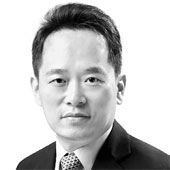Deregulate from the top
이 글자크기로 변경됩니다.
(예시) 가장 빠른 뉴스가 있고 다양한 정보, 쌍방향 소통이 숨쉬는 다음뉴스를 만나보세요. 다음뉴스는 국내외 주요이슈와 실시간 속보, 문화생활 및 다양한 분야의 뉴스를 입체적으로 전달하고 있습니다.

Kim Dong-hoThe author is an editorial writer at the JoongAng Ilbo.
President Yoon Suk-yeol stops to take questions from reporters before he heads up to his office in Yongsan in the morning. He explains state affairs in depth. It feels as if traffic runs smoothly due to orderly traffic control and clarity in state management. But there had been two mishaps. On questions related to the reshuffle of top police officers without his approval and labor reform outlines announced by the minister of employment, the president claimed he have heard nothing of them.
A government announcement without a prior briefing with — and an endorsement from — the president would have been unthinkable in past administrations. The National Police Agency claimed to have followed custom. But the president disapproved of it as a “serious neglect of public discipline.” Transfers of a number of high-ranking police officers should have had prior approval from the president. How such things could have happened remains unclear. Labor reform plans announced by Employment and Labor Minister Lee Jeong-shik also were released to the press according to the rule. Yet the president claimed the outline was not the government’s official position.
A monarch used to oversee all state affairs. The question of how much of affairs a president of today must oversee demands deliberation. It is good for a head of state to show interest in many affairs. But he or she cannot command everything. The two recent fiascos underscore two principles: first, the president cannot take care of everything; and second, there must be priorities in presidential role.
The president must oversee regulatory reform as it directly influences people’s livelihoods. A strategic meeting on deregulation and strategy is among the 110 state agenda items of the Yoon administration. The meeting would include private enterprise and the government to identify regulatory stumbling blocks and remove them. Yoon has promised to preside over the meetings. A task force under the Ministry of Economy and Finance will devise effective ways to reform regulations next month.
The task force plans to announce short-term goals in mid-July and submit agenda items to the strategy meeting chaired by the president.

Sakong Il, the former finance minister, emphases that President Yoon Suk-yeol must directly handle the urgent issue of deregulation over the next five years. [KIM HYUN-DONG]
The task force to be headed by Deputy Prime Minister for Economic Affairs Choo Kyung-ho, who also serves as finance minister, will bring in other related ministers to examine regulatory challenges and hurdles in environment, healthcare, medical, new industries, land and locations, shadow regulations and licensing. The task force will set up divisions by theme and sector to hold a meeting every other week with a vice finance minister chairing the meeting. The government plans to include the private sector in the regulatory reform as much as possible.
The readiness looks perfect. But bureaucrats are excellent in briefing. All past administrations vowed regulatory reforms in their unique way of expression — President Lee Myung-bak promising to remove the telephone poles that get in the way of factories and President Moon Jae-in pledging to do away with red flags in the regulatory field, for example.
But no progress had been made. Former finance minister Sakong Il, who served as the longest senior presidential secretary on economic affairs, had a word of advice. During a phone interview, he reminded me how former President Park Chung Hee presided over meetings to promote exports. Out of 152 meetings, he chaired 147. Industrialization plans and foundations to build today’s global No. 10 economy were prepared in the meetings.
Sakong argued that Yoon’s presence at the strategy meetings will determine the outcome of regulatory reforms. For instance, the meetings should be fixed at a certain day each month for the president to preside over. Government offices must hand in their reports in advance and offer updates on progress. The president must check on the progress so that the plans do not derail, Sakong said. Such leadership makes a difference, he added. He was saying that the president should be the chief commander on regulatory reforms. Yoon must pursue them consistently for five years. By the time his term ends in May 2027, the outcomes may start to show.
Copyright © 코리아중앙데일리. 무단전재 및 재배포 금지.
- HYBE not required to disclose BTS 'hiatus,' Korea Exchange says
- China turns the table on Korea with low-end chips
- BTS's V apologizes for not greeting reporters or fans at airport
- Son Heung-min mural painted on Tottenham building
- U.S. Treasury Secretary Janet Yellen to visit Korea in July
- Korea gets druggier and teens are the youngest victims
- BTS's V, Blackpink's Lisa, actor Park Bo-gum attend Paris Fashion Week's Celine show
- BTS members' individual endeavors may mean the best is 'Yet to Come'
- Cha Eun-woo to tour Asia for fan meet-and-greet
- Lee Myung-bak's prison sentence suspended for 3 months